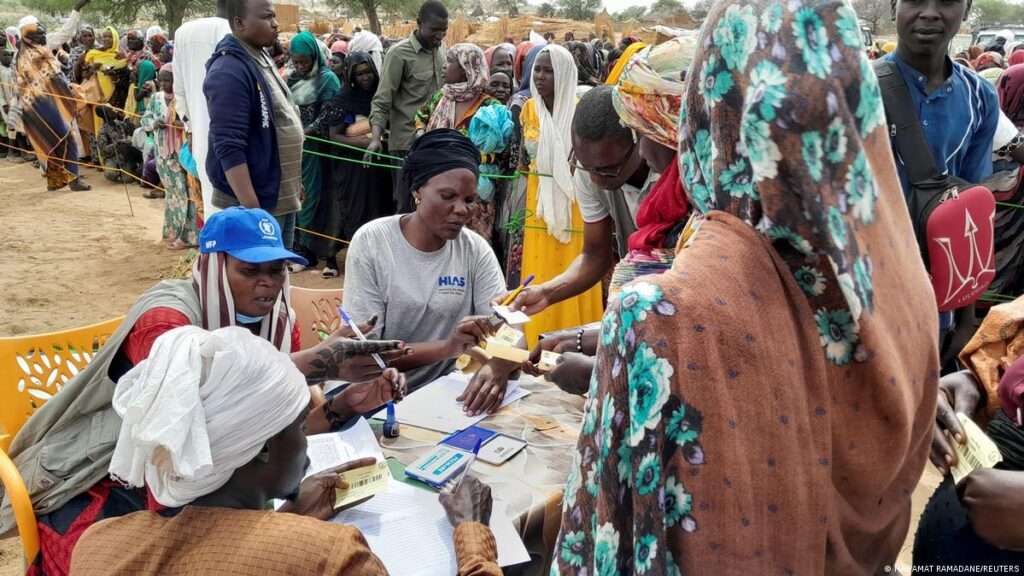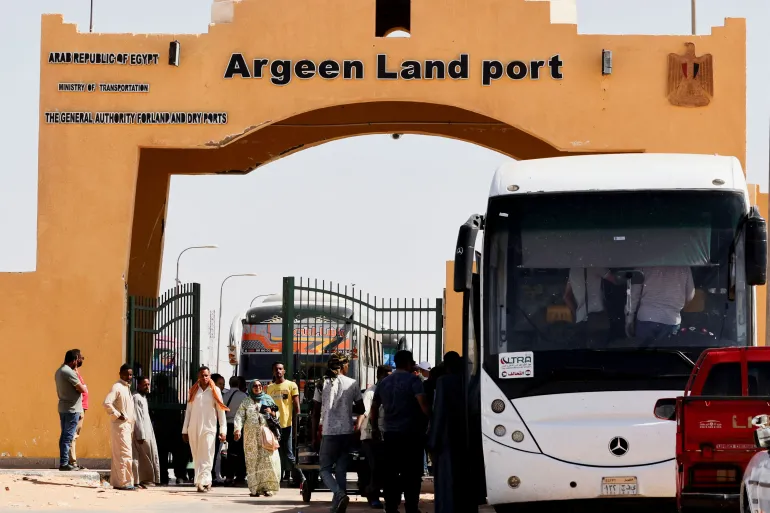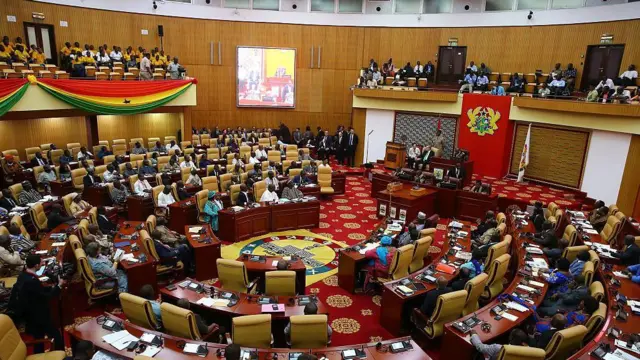Sudanese fleeing the fighting between rival generals in their capital flooded an already overwhelmed city on the Red Sea and Sudan’s northern borders with Egypt, as explosions and gunfire echoed Tuesday in Khartoum.
Many exhausted Sudanese and foreigners arrived in Port Sudan, the country’s main seaport, joining thousands who have waited for days to be evacuated out of the chaos-stricken nation. Others have been driven in packed buses and trucks, seeking shelter in Egypt, Sudan’s northern neighbor.

“Much of the capital has become empty,” said Abdalla al-Fatih, a Khartoum resident, “all residents of our street fled the war.” The fighting, now in its third week, has turned Khartoum and its neighboring city of Omdurman into a battlefield. Fierce clashes taking place inside residential neighborhoods that have become “ghost areas,” residents say.
The conflict, which capped months of worsening tensions, pits the military, led by Gen. Abdel-Fattah Burhan, against a rival paramilitary group, the Rapid Support Forces, commanded by Gen. Mohamed Hamdan Dagalo.
Al-Fatih’s family managed to get out of Khartoum over the weekend, after they had spent the past two weeks trapped in their home, in Khartoum’s neighborhood of Kafouri, a major flashpoint since the fighting broke out.
After an exhausting 20-hour trip, Al-fatih arrived in Port Sudan together with his family. They found thousands, including many women and children, camping outside the port area. Many had been there for more than a week, with no food and other services, he said. Port Sudan has become a hub for foreign governments to evacuate their citizens’ air and sea.

At the congested crossing points with Egypt, thousands of families have waited for days inside buses or sought temporary shelter in the border city of Wadi Halfa to finalize their paperwork to be allowed into Egypt.
Yusuf Abdel-Rahman is a Sudanese university student who crossed into Egypt along his family, through the Ashkit crossing point late Monday. They spent their night at a community hostel in Egypt’s southern city of Aswan, and plan to board a train to Cairo, he said.
Abdel-Rahman’s family went first to the Arqin crossing point, over the weekend. It was overcrowded and they couldn’t reach the customs area, and then decided to move to the Ashkit crossing after they heard from people there that the crossing would be easier, he said. “It’s a chaotic situation in Arqin,” he said over the phone. “Women, children and patients are stranded in the desert with no food, no water.”
Abdel-Rahman has reported destructions and lootings particularly in upscale neighborhood in the capital. He said a neighbor told them by phone said armed men in RSF uniform stormed their home in Khartoum’s Amarat neighborhood, a day after they fled the capital. Many Sudanese have shared their experiences about their homes, been stormed and looted by armed men. “We are lucky that they didn’t enter our home at the time of storming,” he said. “We would have ended up dead bodies.”
The Busy Borders of Sudanese Neighbors

The fighting has displaced at least 334,000 people inside Sudan, and sent thousands more to neighboring countries, including Egypt, Chad, South Sudan, Central African Republic and Ethiopia, according to U.N. agencies.
“Now we’re seeing some extremely fast-moving situations along the borders,” said Paul Dillon, spokesman for the International Organization for Migration, told a news briefing in Geneva.
At the Sudanese borders with Ethiopia, he said, between 900 and 1,000 arrive daily at the border with Ethiopia, where “there’s a desperate lack of wash services, food, shelter, water, medical assistance.” About 20,000 people have crossed into Chad, which borders Darfur city of Genena, where clashes last week killed dozens and injured thousands.
Aleksandra Roulet-Cimpric, Chad Country Director with the International Rescue Committee, described dire conditions for the arrivals, many of whom, mainly women and children have taken shelter under trees in an “extremely hot” weather.

The U.N. High Commissioner for Refugees Filippo Grandi warned that, the number of people fleeing the conflict to neighboring countries could surpass 800,000. “We hope it doesn’t come to that, but if violence doesn’t stop we will see more people forced to flee Sudan seeking safety,” he disclosed.
At least 436 civilians have been killed and more than 1,200 injured since the fighting began, according to figures on Monday by the Doctors’ Syndicate, which tracks civilian casualties. As of a week ago, the Sudanese Health Ministry had counted at least 530 people killed, including civilians and combatants, with another 4,500 wounded, but those figures haven’t been updated since.
READ ALSO:Leave Sudan, UK Foreign Secretary Urges Briton Nationals





















